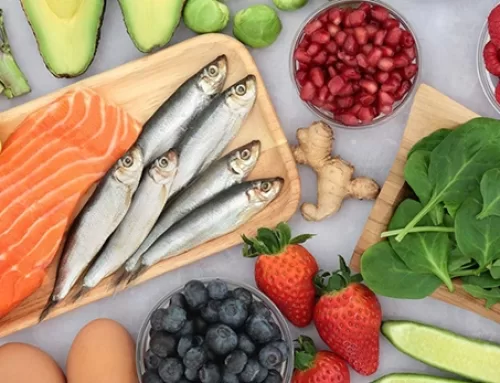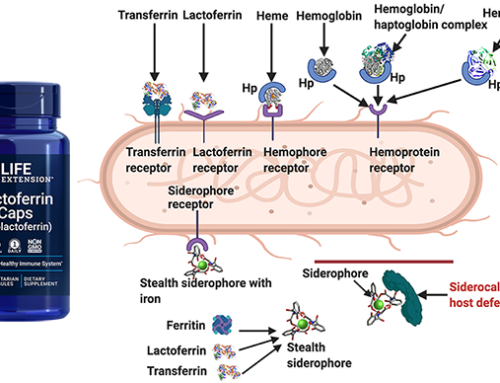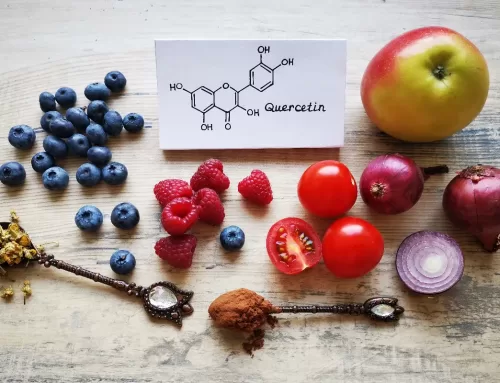More than 50 million adults in the U.S. have arthritis, which is a general term describing joint pain or disease. Osteoarthritis (OA) is the most common type, affecting 31 million Americans, while another 1.5 million suffer from rheumatoid arthritis (RA) [Arthritis Foundation]. Adopting an anti-inflammatory diet can help in the pain management of OA and RA, as inflammation plays a key role in both forms.
OA vs. RA
OA is a wear-and-tear condition in which cartilage gets broken down and eventually bone starts rubbing on bone, causing debilitating pain. While inflammation is not the root cause of OA, cartilage damage can trigger inflammatory processes which has a cascading effect that causes joint damage over time. Excess weight is also associated with inflammation and puts even more pressure on the joints which hastens further joint damage.
Unlike OA, RA is an autoimmune disease in which the immune system attacks the joints, resulting in a condition where the synovial fluid around the joint is inflamed, and that inflammation is what results in pain and morning stiffness.
Diet and Inflammation
Your overall Diet, individual foods, and nutrients all impact inflammation but diets centered around fish, fruits, and vegetables have been shown to reduce inflammation [Arthritis Foundation].
Fatty Acids. Omega-3 fatty acids found in coldwater fish and fish oil probably have the most solid  research that supports their impact in decreasing inflammation. It’s suggested by the Arthritis Foundation that consuming 1 g, four times a day is optimal for RA and OA. I personally take 3 grams of fish oil everyday. Plant sources of omega-3s (ALA) include walnuts, chia, and flax seeds but studies have not confirmed this form as protective against inflammation as fish oils. Also remember to limit other foods with pro-inflammatory fats; especially red meat which is high in arachidonic acid. Plant sources can be just as bad though, overconsumption of omega-6 fatty acids found in canola, corn, sunflower/safflower seed oils combined with a low intake of omega-3’s can result in increased inflammation. Saturated and trans fatty acids seem to promote inflammation as well, however their are different types of saturated fats, like coconut and avocado oil, that don’t seem to have the same inflammatory response as saturated fats from animals.
research that supports their impact in decreasing inflammation. It’s suggested by the Arthritis Foundation that consuming 1 g, four times a day is optimal for RA and OA. I personally take 3 grams of fish oil everyday. Plant sources of omega-3s (ALA) include walnuts, chia, and flax seeds but studies have not confirmed this form as protective against inflammation as fish oils. Also remember to limit other foods with pro-inflammatory fats; especially red meat which is high in arachidonic acid. Plant sources can be just as bad though, overconsumption of omega-6 fatty acids found in canola, corn, sunflower/safflower seed oils combined with a low intake of omega-3’s can result in increased inflammation. Saturated and trans fatty acids seem to promote inflammation as well, however their are different types of saturated fats, like coconut and avocado oil, that don’t seem to have the same inflammatory response as saturated fats from animals.
Olive Oil. Oleocanthal, a compound found in extra-virgin olive oil, has been shown to inhibit pro-inflammatory enzymes. Perhaps this is why Mediterraneans still have a lower mortality rate and longer lifespan than people in the USA even though there fat and carbohydrate intake is relatively high?
Probiotics. Probiotics can produce butyric acid in the colon. Butyric acid helps keep the colon cells and gut mucosa healthy while not allowing compounds to cross over (a.k.a. leaky gut syndrome) which can potentially trigger inflammation.
Dietary Fiber. Fiber has been shown to lower C-reactive protein levels, a key marker of inflammation in our bodies. Fiber, especially pre-biotic fiber, is also important for probiotics to work properly. Essentially prebiotic fiber gives the probiotics, or good bacteria, the fuel needed to produce the butyric acid which in turn may help prevent leaky gut syndrome.
 Fruits and Vegetables. In addition to providing fiber and micronutrients, fruits and vegetables are linked with lower inflammation in the body due to the presence of phytochemicals, which possess antioxidant and antioxidant activity.
Fruits and Vegetables. In addition to providing fiber and micronutrients, fruits and vegetables are linked with lower inflammation in the body due to the presence of phytochemicals, which possess antioxidant and antioxidant activity.
Vitamin D. Inflammation is also associated with low vitamin D levels. It is well known that those with RA develop reduced bone mass or softening of the bones earlier in life than those without RA. Vitamin D is synthesized in the skin when exposed to ultraviolet light, and occurs naturally in only a few foods (fish, and small amounts in egg yolks). It can also be obtained from foods (like some cereals) and beverages (milk) fortified with the vitamin. It is important to check the nutrition facts panel of packaged products for vitamin D content, and have yourself checked by a physician for possible low Vitamin D. If you do in fact find out that you have low vitamin D levels try taking a supplemental form of vitamin D3.
Sugar and Refined Carbs. High intakes of added sugars and refined carbohydrates have been linked to increased inflammation in the body.
What to Do
Weight loss is typically the first line of defense to help reduce pressure on the joints and reduce inflammation, particularly with OA. Each person may react differently to food and food components, so you may benefit from working with a registered dietitian or health coach who can help identify specific triggers. In the end, eating a balanced diet rich in whole foods—fish, beans, nuts, fruits, and vegetables—may be your best bet to help reduce inflammation through diet.
Anti-Inflammatory Diet; How To
There is no one-size-fits-all anti-inflammatory diet so eliminating and reintroducing is the best way to see how certain foods affect you. That said particular foods and nutrients have been shown to typically impact inflammation in the human body. To reduce inflammation:
Eat More:
– Fatty fish (salmon, trout, tuna, sardines, mackerel, herring) or Fish oil (from a reputable company as oxidation/sunlight can destroy these gentle oils)
– Extra-virgin olive oil
– Dietary fiber (vegetables, beans, nuts, seeds)
– Fruits and vegetables (all colors)
– Probiotic Supplements
– Vitamin D Supplements & fortified plant based milks (hemp, almond, macadamia nut milk)
Eat Less or Eliminate:
– Red meats (try to limit drastically, maybe once a month or eliminate if possible)
– Saturated fat (higher fat meats, butter, cream)
– Trans fat (fried foods, stick margarine, donuts)
– Added sugars (desserts, sugar-sweetened beverages, candies)
– Refined carbohydrates and grains (white breads, pasta, crackers, and white rice [some people may tolerate grains better than others so try eliminating and then reintroducing to diet to see effects])







